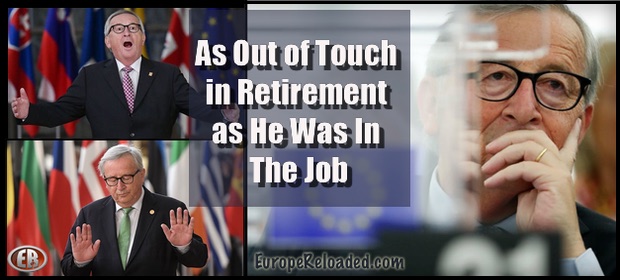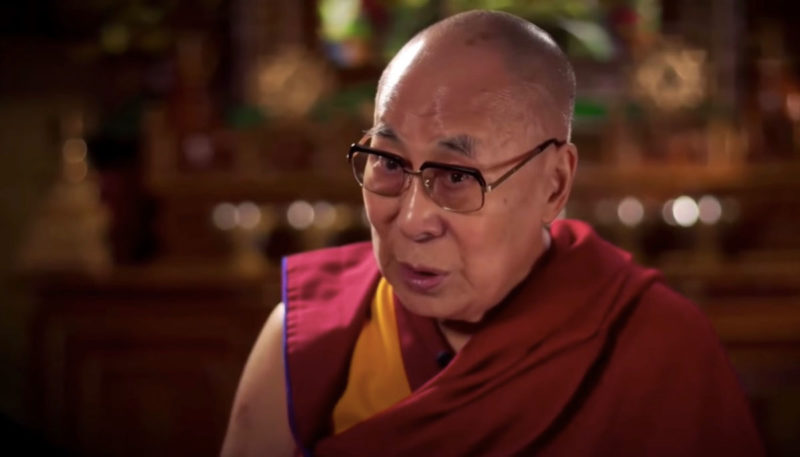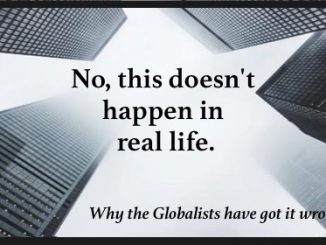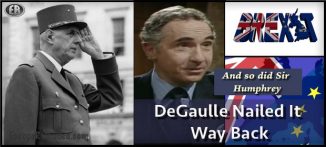
Retiring EU Chief Jean-Claude Juncker Still Has No Idea What He Did Wrong
“I am sad that I was not able to make Europeans love Europe”
The retiring president of the European Commission, Jean-Claude Juncker, has been unusually outspoken during his last weeks in office. He recently had a long interview with the Belgian newspaper L’Écho in which he discussed his actions and frustrations as head of the European Union. Juncker has since 2014 presided over the Greek crisis, the migrant crisis, and, most ominously for Eurocrats, the British vote to withdraw from the EU. His comments are highly revealing about the mentality of the EU’s top officials.
Juncker opens with comments on how little Belgium is failing to consolidate as a nation. Belgium is made up of Dutch-speaking Flanders in the north and French-speaking Wallonia in the south. In the east, there is even a small German-speaking community. Meanwhile the capital Brussels – initially Dutch-speaking, then French-speaking – has essentially been handed over to Afro-Islamic migrants, European expats, and Gypsies. The indigenous Belgians form a small minority there.
To Juncker:
I observe, in the 30 years that I have frequented the Belgian Riviera, that tolerance has fallen. Thirty years ago, when I went to the baker’s or the butcher’s, I could order in French; today they no longer accept this. So I speak German – they accept Germans more than they do Francophones. Belgium could be a model of successful cohabitation. Unfortunately it isn’t, something which saddens me. . . .
Belgium is a State, but the communities consider themselves to be nations – I mean Flanders. Wallonia itself does not have a national conception [of itself], whereas Flanders believes itself to be and acts like a nation. And it’s a miracle to see these two entities, so different in the end, live together without living together.
In short, Juncker is essentially agreeing with Nigel Farage’s controversial statement on Belgium made during his legendary rant some years ago against then-EU Council President Herman Van Rompuy: “You appear to have a loathing for the very concept of nation-states – perhaps that’s because you come from Belgium, which of course is pretty much a non-country.” Juncker and Farage have merely pointed out the obvious. Still, the British newspaper The Independent could write at the time with cosmopolitan faux erudition: “There is an old right-wing prejudice in Britain that Belgium does not exist.”
.
In multinational states, democratic politics typical encourages centrifugal and secessionist tendencies. Speakers of different languages tend to not socialize with each other, tend to consume their own media catering to their own interests and tastes, and develop a linguistically-delineated common consciousness (one of the characteristics of nationhood). Media and democratic politicians then naturally appeal to these communities and tend to tear them apart. This can be peaceful affair, as in Belgium or Canada, or an extremely bloody one, as when democracy shattered communist Yugoslavia.
In Belgium, Wallonia is a Socialist-voting economic failure, while economically-dynamic Flanders votes overwhelmingly for (pseudo-)nationalist parties. The Walloons want more money from the central government, while the Flemish are tired of forking out money to the Walloons. Neither enjoy being forced to learn the other community’s language, namely French or Dutch, but this is a necessity for many jobs. The Francophones are absurdly intolerant of the Flemish voters’ electoral choices, essentially refusing to give a voice to and demonizing the two biggest Flemish parties.
Juncker insists Belgium’s failure to consolidate as a nation, despite the existence of a Belgian State for almost two centuries, is a “a purely Belgian issue” with no parallel in the EU. But in fact, we see the exact same division between nations in the EU and the same frustrations to the extent these nations are straightjacketed into the same policies (think Germany and Greece in the eurozone). I am perpetually puzzled by the fact that those have who failed to make 10 million Belgians consolidate into a genuine community insist we should perpetually submit to their nagging attempts to do so with 500 million Europeans.
Juncker discusses the migrant crisis, which really marred and defined the latter part of his term, at length. He asks: “First of all: must we protect ourselves against the unfortunate? Must we protect ourselves against those who flee war, torture, rape, and a lack of perspectives for their children?” Well, it is known that German Chancellor Angela Merkel’s decision to let in willy-nilly some 1 million migrants in 2015 predictably led to a massive surge in migrant crime.
Grisly knife- and car-attacks by inbred Islamic terrorists have since become a normal and regular occurrence in Germany. The former German head of intelligence admits that, given their knowing nothing certain about these migrants’ identities, the invasion was “a massive security risk.” In 2016, non-Germans made up 30.5% of all crime suspects in Germany, despite making up only 10% of the population. Murder and manslaughter increased by 14.3% that year, while rape and sexual assault rose by 12.7%. Again in that same year, non-German criminals are recorded to have raped or sexually assaulted over 2,500 women in Germany: that is 7 women every single day.
It is not too much to say that by their irresponsible refusal to police Europe’s borders and enforce Europeans’ immigration laws and preferences, politicians like Juncker and Merkel have the blood of many innocent Europeans on their hands.
Juncker adds, puzzlingly: “I believe that Europe’s honor has always [sic] been to welcome on its soil those who are persecuted for religious, racial, national, and other reasons.” This comment does not make much sense historically.
Juncker doubles down on the EU’s adoption by a super-majority of states, at the Commission’s suggestion, of a forced migrant redistribution program. Predictably then: “others [namely Hungary, Poland, Slovakia…], who were not part of this qualified majority, refused to apply it.” Who could have predicted such measures would prove unpopular and unenforceable, and backfire?
He then says on “this populism and this far-right tendency which would have us say no to the arrival of those different from ourselves”:
I remain disconcerted by the fact that those in Europe, who claim to be Christian-Democrats, are incapable of showing a minimum of solidarity. The Christian spirit which they claim should very naturally lead them to not reject those who are different from ourselves. I find that . . . a-historical, a-biblical.
And I find that too stupid and historically illiterate to further comment on.
Juncker then says that those who fight “what they call the Islamic invasion” will, if only unconsciously, lead to “situations that we knew in the 1930s,” i.e. Nazism and genocide. By the way, Japan remains largely mono-ethnic and took in 42 [sic] refugees in 2018. Politicians like Juncker, however, no doubt will not understand that mono-ethnic nations like Japan will be at far less risk of witnessing ethnic civil war and genocide on their soil than the new ‘diverse’ countries of the West. What’s more, Japanese girls are not at risk of being raped by gangs of Pakistani child-groomers, and Japanese monuments, unlike French ones, are not put behind anti-vehicular obstacles and bulletproof glass to ward off Islamic terrorists. Heck, if you rent a bike in Japan, you won’t even be given a bike lock the place is so safe.
Juncker says: “Our European way of life consists precisely in the protection of all, and particularly of the most vulnerable.” I don’t necessarily entirely disagree: Europeans are marked by their compassion, by their (often narcissistic) moralism. Hence why white people are so eager to give their time and money to charities for all sorts of causes, including many which principally benefit non-Europeans. Helping people in dire need, especially if this only requires mere economic sacrifice from oneself, is a mark of compassion and self-control. Europe ought to help promote peace in the Middle East – rejecting any policy of wrecking Arab nations through wars of aggression – and make conditions more livable for refugees back home.
According to Juncker, however, the “European way of life” means adopting an immigration policy which, in the long run, will destroy Europe genetically and culturally. According to Juncker, the “Christian spirit” requires turning the historic heartland of Christendom into an Islamic continent, just as the Roman Christian Near East and North Africa were brutally Islamized by force some 14 centuries ago.
I suggest that His Holiness the Dalai Lama is much wiser. He recently said:
European countries should take these refugees and give them education and training.. And then [they should] return to their own land. . . . Limited number [of refugees]… OK. But whole Europe eventually become Muslim country? Impossible. Or African country? Also impossible. . . . The goal should be that migrants return and help rebuild their countries. . . . They themselves [the refugees], I think better in their own land. Better. Keep Europe for Europeans.
Genuinely helping others does not mean opening up your homeland to invasion, nor does it mean destroying yourself.
Juncker is pessimistic about the future:
You ask me if I am worried: yes. And I say that we need to fight right-wing extremism and that we must bar the populists’ path. You cannot fight populists by taking up half of their discourse: if you run after them, you never see the voters facing them. [sic]
In short, you must continue to ignore voters’ concern about replacement-level immigration and the reduction of indigenous Europeans to minorityhood.
On Hungarian Prime Minister Viktor Orbán:
Orbán, for me, is my dictator friend. I have a good personal relationship with him. I admired him a lot at the end of the 90s when as a young activist in one of the main public squares in Budapest, he said: the Russian troops leave Hungary. One needed courage at the time to say that. Then he changed his ideas. But I still like him as a person.
Juncker, a hard drinker, is a chummy guy, no doubt. I have actually enjoyed watching him over the years: as the decades-long prime minister of Luxembourg, he could be quite candid about EU leaders’ undemocratic and deceitful methods.
On Brexit:
I have always observed during these citizen dialogues that people thought that Europe was in charge of everything. I had trouble explaining to citizens that I could see this was not the case. But as the papers always say that Europe is omnipresent, the citizens begin to believe. That is by the way the reason for the Brexit referendum’s result.
This is partly true: both anti-EU and pro-EU activists have tended to overstate Brussels’ impact. However, the fact is that Juncker and Merkel, by welcoming 1 million illegal immigrants, really gave the Brexiteers a golden opportunity. I don’t think Brexit would have occurred possible without this mistake and the occasion it gave Farage for his memorable campaign poster.
Cameron was convinced he would win the [Brexit] referendum. I told him tens of times that he would lose. I made a bet with the British [EU] commissioner at the time, Lord Jonathan Hill, who said they would win. I bet a euro against a pound. I won the pound.
As usual, it’s very telling that Juncker simply takes it for granted that a major European nation would choose to leave the EU if ever given the opportunity to do so.
Still, Juncker considers his administration a success: Greece was kept in the eurozone (albeit at a massive socio-economic cost), 14 trade deals were sealed, a trade war with Donald Trump’s America was averted, and “all member states adopt[ed] a baseline foundation of social rights – including a minimum social salary” (the latter is dismal in the extreme and not Union-wide, the average wage in Bulgaria is €500 per month).
Juncker concludes:
I am sad that I was not able to make Europeans love Europe. There is a distance between Europeans and Europe which saddens me. Even though according to the latest polls, the European Union has never been so liked by Europeans as it is today. I read that the poll results are good, but I don’t believe them.
The interview with Juncker implies he is writing his memoirs, dedicated to Europe: “I will describe the love of my life. It is hard to write on love, but any description of love lacks nuance.”
So, as the end of his career, Juncker is as puzzled as ever about the EU’s unpopularity. It never occurs to him that the EU might be prove more popular if it actually appealed to Europeans’ common civilizational identity and was responsive to citizens’ concerns regarding replacement-level Afro-Islamic immigration.
But, the fact is, for men like Juncker words like “Europe” or “Christian” have no content, except the latest ideological fashions of the globalist elite, namely people like himself. These words certainly have nothing to do with the hard measures which men like Charlemagne – which Eurocrats still claim as some kind of precursor – actually did to save Europe from Islamic invasion and unite the continent culturally and religiously (look up “Widukind”). For Juncker, “Europe” does not evoke a race and civilization going back thousands of years, nor a family of nations, but is merely an economic-administrative apparatus charged with turning this western segment of Eurasia into just another sector of the Borderless Global Bazaar.
At the risk of stoking inter-generational resentment, I would say Juncker embodies everything wrong with the Boomer Generation. He ultimately sees no other aim than economic growth and material comfort. For them, history began with Adolf Hitler and ended with Martin Luther King. Nothing else worth learning, emulating or learning from has ever happened. Hence, such men can see nothing wrong with transforming Europe’s demographics into an unholy cross between Brazil and Bosnia, with predictable results. It will be ugly. But, of course, those with six-figure salaries will do just fine . . .
It is noteworthy that many of the top European leaders in recent years – Juncker and Merkel, but also France’s Emmanuel Macron, Britain’s Theresa May – are childless. They thus have no personal biological stake in the future. Why should they then care about what Europe looks like in 50 or 100 years or fret about importing other peoples as substitutes for European children?
In a noteworthy change of tone, the incoming EU Commission president, the German Ursula von der Leyen, has 7 children. She told the European Parliament in her opening statement to be confirmed as president:
I would like to tell you a story about perspective. Four years ago, I was lucky enough to welcome a 19-year old refugee from Syria into my home and my family. He spoke no German and was deeply scarred by his experience of civil war and flight. Today, 4 years later, he is fluent in German, English and Arabic. He is a community leader by day, in vocational training and a student for his high school degree by night. He is an inspiration for us all. One day, he wants to go home.
A comforting punchline.

••••
The Liberty Beacon Project is now expanding at a near exponential rate, and for this we are grateful and excited! But we must also be practical. For 7 years we have not asked for any donations, and have built this project with our own funds as we grew. We are now experiencing ever increasing growing pains due to the large number of websites and projects we represent. So we have just installed donation buttons on our websites and ask that you consider this when you visit them. Nothing is too small. We thank you for all your support and your considerations … (TLB)
••••
Comment Policy: As a privately owned web site, we reserve the right to remove comments that contain spam, advertising, vulgarity, threats of violence, racism, or personal/abusive attacks on other users. This also applies to trolling, the use of more than one alias, or just intentional mischief. Enforcement of this policy is at the discretion of this websites administrators. Repeat offenders may be blocked or permanently banned without prior warning.
••••
Disclaimer: TLB websites contain copyrighted material the use of which has not always been specifically authorized by the copyright owner. We are making such material available to our readers under the provisions of “fair use” in an effort to advance a better understanding of political, health, economic and social issues. The material on this site is distributed without profit to those who have expressed a prior interest in receiving it for research and educational purposes. If you wish to use copyrighted material for purposes other than “fair use” you must request permission from the copyright owner.
••••
Disclaimer: The information and opinions shared are for informational purposes only including, but not limited to, text, graphics, images and other material are not intended as medical advice or instruction. Nothing mentioned is intended to be a substitute for professional medical advice, diagnosis or treatment.










